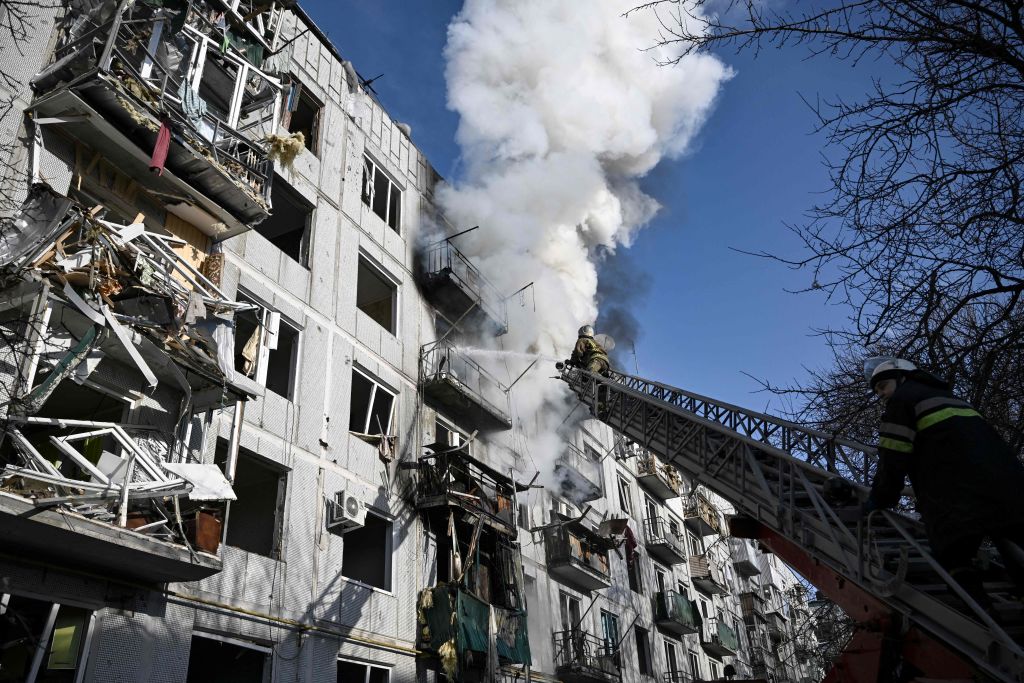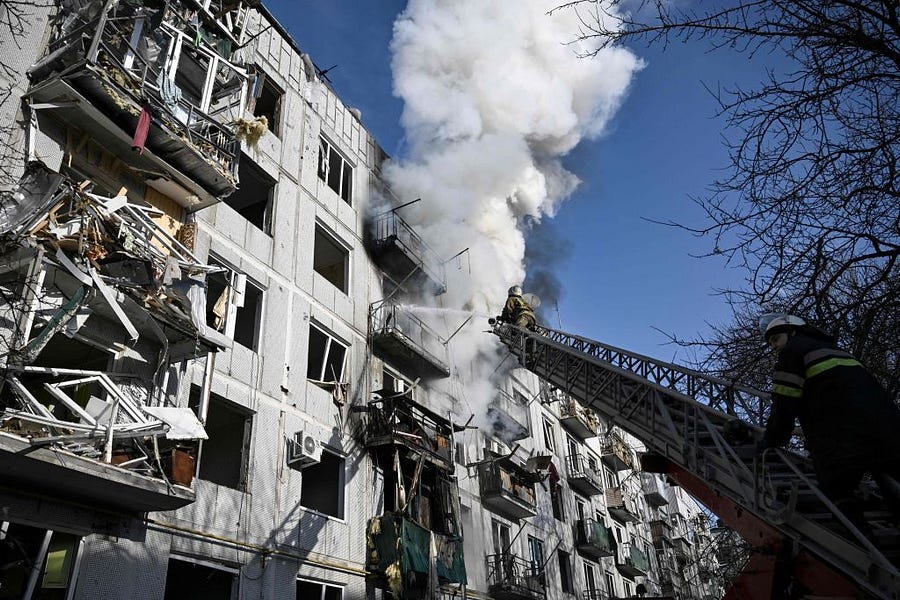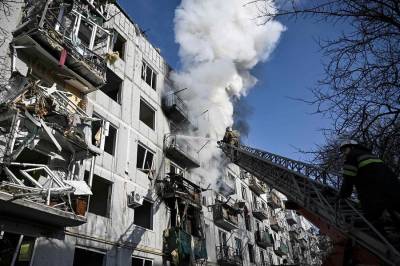The world has changed. Early Thursday morning, Russian television aired a speech from President Vladimir Putin in which he declared he had “decided to conduct a special military operation” in Ukraine. The invasion began shortly thereafter.
Quick Hits: Today’s Top Stories
Putin claimed in his speech the invasion was aimed at “demilitarizing and de-Nazifying Ukraine,” and that Russia has “no plans to occupy Ukrainian territory.” But Ukrainian Foreign Minister Dmytro Kuleba categorized the move as a “full-scale invasion,” with “peaceful Ukrainian cities under strike.” Sources on the ground reported missile strikes and shellings in several cities across the country—including Kyiv—and the Russian military confirmed it was striking Ukraine’s military airfields and air defense facilities. Ukrainian officials said Russian troops have crossed the border from Crimea, Russia, and Belarus, and that there have already been “hundreds of casualties.”
Ukrainian President Volodymyr Zelensky announced he was imposing martial law throughout the country, and encouraged citizens to “keep calm” and “stay at home if you can.” Ukraine began conscripting reservists between the ages of 18 and 60 on Wednesday, and its Parliament voted yesterday to approve a law allowing all civilians to carry firearms and act in self defense. Oleksiy Danilov, secretary of Ukraine’s National Security and Defense Council, called for a 30-day, nationwide state of emergency yesterday that, if approved by Parliament, would allow the government to restrict transportation, implement curfews, and impose additional security measures.
After waiving them last year because they “risked undermining a critical alliance with Germany,” President Joe Biden announced Wednesday the United States would reimpose sanctions on the entity and corporate officers behind the Nord Stream 2 pipeline in response to Russia’s aggression in Ukraine. Sen. Ted Cruz praised the decision and said he would lift the hold on State Department nominees he had implemented in response to the initial waiving.
Canadian Prime Minister Justin Trudeau announced Wednesday he was revoking his government’s use of the Emergencies Act that had been used to disperse anti-mandate protesters in Ottawa over the past week. The House of Commons had voted Monday to allow the measure to remain in place through mid-March, but Trudeau said yesterday the “situation is no longer an emergency.” Finance Department officials said the government had begun unfreezing the more than 200 bank accounts related to the protest that had been restricted.
The Centers for Disease Control updated its COVID-19 vaccine guidance on Tuesday, noting that an eight-week interval between the first and second doses may be “optimal” for males ages 12 to 39 to reduce the “small” risk of myocarditis associated with the mRNA vaccines. The agency said the currently authorized three-week interval for the Pfizer-BioNTech vaccine and four-week interval for the Moderna vaccine remain “safe and effective,” and should still be utilized by older and immunocompromised individuals.
Defense Secretary Lloyd Austin on Wednesday approved requests from D.C. and Capitol Police for National Guard support in advance of a potential Canadian-style trucker convoy en route to Washington, D.C. for President Joe Biden’s State of the Union address next week. Up to 700 unarmed members of the National Guard will deploy from February 26 through March 7 to aid with “traffic control.”
The New York Times reported Wednesday that two prosecutors leading the Manhattan district attorney’s investigation into former President Donald Trump and his business practices resigned yesterday after the district attorney, Alvin Bragg, expressed doubts about moving forward with the case.
Russia Launches War on Ukraine

From the moment Russia began to amass tens of thousands of troops along its border with Ukraine last April, a full-scale invasion of the former Soviet republic became a distinct possibility. When troop levels swelled to more than 150,000 in December and January, such an incursion seemingly became an inevitability. And in the wee hours of Thursday morning, it became a reality.
“I have decided to conduct a special military operation,” Russian President Vladimir Putin said in a speech that was likely recorded on Monday, but aired early this morning—while Russia was chairing a United Nations Security Council meeting. “Its goal is to protect people who have been abused by the genocide of the Kyiv regime for eight years. And to this end, we will strive for the demilitarization and denazification of Ukraine, as well as bringing to justice those who committed numerous bloody crimes against civilians, including citizens of the Russian Federation.” (Ukraine has repeatedly dismissed such accusations of genocide as fabricated pretext to justify an invasion, and Ukraine’s “Nazism” would likely come as a surprise to its Jewish president.)
Putin claimed Russia’s plans didn’t include a lengthy occupation of Ukrainian territories, but his nearly 30-minute speech included a stark warning for the West. “Whoever tries to hinder us, and even more so, to create threats to our country, to our people, should know that Russia’s response will be immediate,” Putin said, growing increasingly agitated. “It will lead you to such consequences that you have never encountered in your history.”
“I hope,” he concluded, “that I will be heard.”
Within minutes, explosions could be heard in cities throughout Ukraine, as Russia’s armed forces began striking Ukrainian military infrastructure—particularly its command centers, supply depots, air defense systems, bridges, and airports. The shellings were concentrated in the east, but certainly not limited to the Donbass region: Sources on the ground heard blasts near Kyiv, Kharkiv, Odessa, Kramatorsk, and Dnipro, among other cities. By about 2 a.m. ET, Russia was claiming to have knocked out just about all of Ukraine’s airbases and air defense systems, which, if true, would mean the aggressors have near-total control of the skies. And if Russian forces are able to take the Hostomel airport, they will likely begin flying in additional military equipment to hasten the fall of Kyiv.
Iliya Kusa, a Kyiv-based analyst at Ukraine Institute for the Future, wasn’t asleep when The Dispatch reached out around 6 a.m. his time. “We’re hearing several—I think, explosions, or something like that,” he said. “These are rocket attacks against Kyiv and other cities—against the military infrastructure.”
But Russia won’t stop there. A few hours after the airstrikes commenced, reports began to emerge of a multi-pronged ground invasion, with Ukraine’s Border Control later confirming convoys of Russian (and Belarusian) soldiers crossed the border into Ukraine from Belarus in the north, Russia in the east, and Crimea in the south. The goal appears to be the formation of a pincer movement toward Kyiv, with Russian troops reportedly already on the ground in the Luhansk, Sumy, Kharkiv, Chernihiv, and Zhytomyr regions—and possibly more.
On the ground in Ukrainian cities thus far, the situation might best be summed up with one word: lines. Lines to get cash out of the ATM, lines to pick up prescriptions at the pharmacy, lines to fill up at the gas station. Thousands upon thousands of cars were seen stuck in traffic Thursday morning attempting to leave Kyiv and head west toward Poland—and away from Russia.
Officials with Ukraine’s Interior Ministry claim the number of casualties already to be in the hundreds nationwide—and there are reports circulating of civilian apartment buildings being hit in the strikes—but they have been able to confirm only a small fraction of that figure: at least six soldiers dead following a strike in Odessa, with seven wounded and 19 more unaccounted for. Another Ukrainian leadership source pegged the confirmed death toll at more than 40. It’s unlikely to matter much given the military disparities between the two countries, but the underdog has been able to claim some small victories thus far: Ukraine’s General Staff reported its forces have blown up four Russian tanks, downed six planes and two helicopters, and killed “about 50” Russian “occupiers.” We cannot independently verify those assertions.
It’s worth pausing here to note that, in the fog of war, just about every piece of new information should come with an “allegedly” or “reportedly” attached to it. The Dispatch is not on the ground in Ukraine; we’re piecing together what is happening by talking to and learning from people who are. Hundreds, if not thousands, of videos and photographs from today’s attacks are already circulating on social media, and we can’t yet independently confirm which ones are real, and which ones aren’t. Russia will almost surely be spreading disinformation to encourage a premature Ukrainian surrender, Ukraine could do the same to boost morale. Be careful where you get your information.
In a short video released Thursday morning, Ukrainian President Volodymyr Zelensky announced the imposition of martial law, and urged citizens to remain calm. “Stay at home if you can. We are working. The army is working. The whole sector of defense and security is working,” he said. “No panic. We are strong. We are ready for everything. We will win over everybody because we are Ukraine.” A source close to Zelensky told Axios this week the president had no plans to leave Kyiv: “[He] will not be running away from his own capital.”
Hours before Russia began its invasion—and after reportedly trying without success to reach Putin on the phone—Zelensky delivered a final emotional plea for peace, in Russian and aimed squarely at the Russian people. “They told you that Ukraine is posing a threat to Russia. It was not the case in the past, not in the present, it’s not going to be in the future,” he said. “I know that they [the Russian state] won’t show my address on Russian TV, but Russian people have to see it. They need to know the truth, and the truth is that it is time to stop now, before it is too late. And if the Russian leaders don’t want to sit with us behind the table for the sake of peace, maybe they will sit behind the table with you.”
By 4:54 a.m. ET, Zelensky was tweeting the Ukrainian government will “give weapons to anyone who wants to defend the country. Be ready to support Ukraine in the squares of our cities.” At 4:55 a.m. ET, he severed diplomatic relations with Russia.
Putin’s decision—like all the decisions that led up to it—was met with widespread international condemnation. French President Emmanuel Macron demanded Russia reverse its decision to wage war “immediately.” British Prime Minister Boris Johnson said he was “appalled” by Putin’s decision to pursue a “path of bloodshed and destruction.” German Chancellor Olaf Scholz described the invasion as an unjustifiable breach of international law. “This is a terrible day for Ukraine and a dark day for Europe,” he added.
In a statement issued last night just before 10:30 p.m. ET, President Joe Biden said he will meet with G7 leaders this morning before announcing “the further consequences” the United States and its allies will impose on Russia. “President Putin has chosen a premeditated war that will bring a catastrophic loss of life and human suffering,” he said. “Russia alone is responsible for the death and destruction this attack will bring, and the United States and its Allies and partners will respond in a united and decisive way. The world will hold Russia accountable.”
It’s not yet clear exactly what form the West’s next tranche of sanctions will take, but countries have theoretically been keeping their powder dry in order to respond more forcefully to something like this. The Biden administration has considered cutting Russia out of the SWIFT financial system, is reportedly finalizing export controls targeting Russia’s technology and manufacturing sectors, and Deputy National Security Adviser Daleep Singh said earlier this week the U.S. is ready to “press a button” and sanction two more Russian banks that hold a combined $750 billion in assets. Johnson promised last week a Russian invasion would result in U.K. sanctions on individuals and companies “of strategic importance” to Russia and the opening up of “the matryoshka dolls of Russian-owned companies and Russian-owned entities to find the ultimate beneficiaries within.” Josep Borrel, the EU’s top foreign affairs official, said this morning the bloc would soon introduce “the harshest package of sanctions we have ever implemented.”
Poland, Estonia, Latvia, and Lithuania have already decided to trigger NATO Article 4, which dictates that member states will “consult together” whenever the “territorial integrity, political independence, or security of any of the Parties is threatened.” Ukraine is not yet a NATO member—that’s a big part of what this whole thing is about—but Estonian Prime Minister Kaja Kallas argued Russia’s aggression “is a threat to the entire world and to all NATO countries.”
In a press release issued before dawn in the U.S., NATO officials said its members had already held such consultations, and decided to “deploy additional defensive land and air forces to the eastern part of the Alliance” and “take additional steps to further strengthen deterrence and defense across the Alliance.”
We’ll have much, much more on this developing story in the coming days and weeks, but a few final takeaways for today.
Most of the U.S. intelligence released publicly in recent weeks turned out to be correct. Not every detail, of course, and the Biden administration’s strategy of disclosing what it learned about Russia’s plans didn’t ultimately stop them from coming to fruition. But the maneuver undercut Putin’s efforts to play the victim, and likely caused him to delay his plans by several days.
Putin has been lying about his intentions for months. When U.S. officials first began raising the alarm about a potential invasion back in November, the Kremlin dismissed the reports as “empty and unfounded efforts to exacerbate tensions.” Just in the past few weeks, Russian officials labeled accusations that they were about to do what they just did “total disinformation,” “hysteria,” and “anti-Russian.” Less than a week ago, Russia’s ambassador to the U.S. said “we are not trying to take any territory of a foreign country” and “Donbas and Luhansk is a part of Ukraine.”
This is more or less the worst-case scenario. Once Russia began its military buildup, analysts foresaw a wide range of endgames: Retreat after winning some diplomatic concessions, cyberattacks aimed at destabilizing the Ukrainian government, a “minor incursion” carving out more of the Donbass region, or a full-scale invasion leading to regime change. We’re in that last bucket. Don’t be surprised if Russian forces begin arresting or assassinating Ukrainian leaders. There’s a reason Putin sought to paint them as “Nazis.”
Expect to see sanctions ratcheted up quickly. This is what Western countries were holding out for; there’s not much further Russia can go.
The world will never be the same. Just before Putin launched his invasion, ABC News’ Martha Raddatz received a message from a Pentagon official: “You are likely in the last few hours of peace on the European continent for a long time to come.”
Worth Your Time
The Ukraine crisis makes Tyler Cowen miss Ronald Reagan. “Reagan knew there were real ‘bad guys,’ and that it was up to leaders and elites to identify them and stand up to them, both rhetorically and diplomatically,” he writes in his latest Bloomberg column. “Most of all, it was important to encourage the American public to internalize these same moral judgments. This may all sound corny and dated, but the pending conflict in Ukraine shows it to be an enduring truth. The complementary Reagan vision was positive, optimistic and focused on what Americans can accomplish when working together. Americans are going to disagree on a lot of issues, he acknowledged, but they should maintain a relatively united front and save their real opprobrium for the truly destructive forces on the global scene. Fast forward 40 years, and it seems that America has almost completely ignored these strictures. Many on the right seem most upset about the worst aspects of the left, and vice versa. Even when bad forces emerge in the international arena, Americans seem far more preoccupied by their fights with each other.”
Leading figures on the new right have drawn on Catholicism’s idea of the “common good” to make the case for a more powerful administrative state. But the “common good,” Bradley Lewis argues for American Purpose, is entirely compatible with liberalism. “The phrase ‘common good,’ ubiquitous in the writings of [Thomas] Aquinas, can mean different things. In the most basic sense, it means a good that is sharable—and for Aquinas, the greatest and most shareable good was God,” he writes. “Aquinas was acutely aware, however, that coercive law was limited in its ability to make persons act virtuously, since genuine virtue depends upon free choice. Law, therefore, was intended mainly to establish a level of civil peace and justice that enabled persons to live together and pursue the good through their own actions. He was under no illusion about how much human perfection could be produced by the political life. The specifically political common good was limited to peace, justice, and an order providing a context for living well.”
Presented Without Comment
Also Presented Without Comment
Also Also Presented Without Comment
Also Also Also Presented Without Comment
Toeing the Company Line
On Wednesday’s Dispatch Podcast, Steve talks to Peter Baker of the New York Times and Susan Glasser of The New Yorker about Russia, Ukraine, Putin and the fraught American politics surrounding the current crisis. Baker and Glasser co-authored Kremlin Rising, a book about Putin’s early years and ascent to power, the themes of which are directly relevant today. “Vladimir Putin is in a war with history,” Glasser says. “He is establishing what he sees as his legacy as the great restorer of Russia. He came to power more than two decades ago with a campaign theme that might be familiar here in the United States, which was essentially ‘Make Russia Great Again.’ And in his view Russia was a great empire and empire needs territory and it needs breathing space, to use a horrifying echo of 20th century European wars. And Vladimir Putin is the restorer….He wants to be Vlad the Great and this is his bid for immortality.”
Jonah’s Wednesday G-File responds to an essay in American Affairs extolling China’s economic success story. “I’m not saying all of the nationalists and integralists are passionately pro-China or pro-Russia. I’m saying that the bizarre inconsistencies in their arguments suggest that the only consistent theme I can discern is a strange obsession with American decadence’ and a stranger infatuation with power,” he writes. “The new post-liberal types don’t object to the state imposing values, censoring speech, or picking winners and losers in the economy in principle. They merely object to the fact that they’re not the ones doing it.”
Dispatch Live viewers got a sneak peek, but The Dispatch is adding another newsletter to its stable! And the timing could not be more fortuitous. Starting next week, Klon Kitchen—a veteran of the U.S. intelligence community and senior fellow at the American Enterprise Institute—will be writing for us about the intersection of national security, cybersecurity, and technology. We’re in the process of setting him up with his own vertical on our website, but in the meantime, make sure you are subscribed to the Vital Interests feed to get his work!
In this week’s Capitolism (🔒), Scott takes a look at the alcohol industry to explain why “politicized thinking on antitrust” is bad news. “The U.S. booze market is unquestionably the most diverse, innovative, and consumer-friendly in our lifetimes—something Treasury itself begrudgingly acknowledges,” he writes. “So if the Biden administration can recommend extra antitrust scrutiny of this market, then no market is safe from federal government intervention.”
Let Us Know
What do you consider to be the most consequential world event you’ve lived through? Where does this stack up?
Reporting by Declan Garvey (@declanpgarvey), Michael Reneau (@MichaelReneau), Andrew Egger (@EggerDC), Charlotte Lawson (@lawsonreports), Audrey Fahlberg (@AudreyFahlberg), Ryan Brown (@RyanP_Brown), Harvest Prude (@HarvestPrude), and Steve Hayes (@stephenfhayes).







Please note that we at The Dispatch hold ourselves, our work, and our commenters to a higher standard than other places on the internet. We welcome comments that foster genuine debate or discussion—including comments critical of us or our work—but responses that include ad hominem attacks on fellow Dispatch members or are intended to stoke fear and anger may be moderated.
With your membership, you only have the ability to comment on The Morning Dispatch articles. Consider upgrading to join the conversation everywhere.